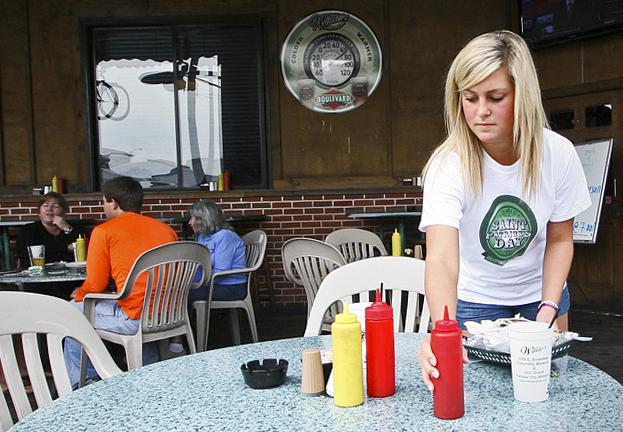Three different proposed initiative petitions could raise Missouri’s minimum wage from $7.65 per hour to $11.00, $12.00 or $15.00 per hour. On June 2, Missouri Secretary of State Jason Kander announced that the petitions were approved for circulation.
The three petitions were submitted by Lara Granich, director of the nonprofit group Missouri Jobs with Justice, according to the Missouri Secretary of State’s website. The goal of all three is to raise the minimum wage, but each petition’s implementation plan differs slightly.
Each of the petitions outline a different minimum wage increase starting with a wage increase to $9.00 an hour in 2017 and include subsequent increases of $1.00 per hour the following years. This yearly increase would stop when the minimum wage reached $11.00 per hour in 2019, $12.00 per hour in 2020 or $15.00 per hour in 2023, for each petition respectively.
Once the stipulated minimum wage is reached, the petitions then further adjust the minimum wage each January based on changes in the Consumer Price Index. In addition, the petitions increase the employer portion of wages for employees who receive tips from 50 to 60 percent of the state minimum wage amount. All three petitions also increase the penalties to employers who do not pay their employees minimum wage.
Before the petitions can be presented to voters on the ballot in the November 2016 elections, they must receive signatures totaling at least five percent of the total number of votes cast in the 2012 governor’s election and must be from at least six of the state’s eight congressional districts.
If the petition to raise Missouri’s minimum wage to $15.00 per hour is implemented, then it is estimated that both the state’s expenses and tax revenues will increase by $489 million annually with a state and local government increase of an estimated $397 million annually, according to the petition.
While Missouri’s minimum wage is higher than the federal minimum wage of $7.25 per hour, Missouri has the 27th lowest minimum wage out of the 29 states, including the District of Columbia, that have a minimum wage higher than the federal level. According to the U.S. Department of Labor, Missouri’s minimum wage increased every year since at least 2012.
With more states such as California, Oregon and Washington all raising their minimum wage to match today’s cost of living, some people in Missouri, such as Shane Cohn, alderman of the 25th Ward in St. Louis, are fighting to raise the minimum wage on a local level. In addition to efforts at the state level, Cohn is sponsoring a bill to eventually raise the minimum wage in St. Louis to $15.00 per hour.
The Missouri Chamber of Commerce and Industry opposes the petition efforts aimed at raising the minimum wage. Brian Bunten, general counsel and director of Legislative Affairs for the Missouri Chamber of Commerce and Industry, said an increase in the minimum wage would drive business away from Missouri to its neighboring states.
“We compete against those states each and every day to not only attract business, but to retain our current businesses as well,” Bunten said. “It’s not hard to imagine a scenario where a business decides to open up shop on the Kansas side of the border where labor costs would be lower in a few years if one of these initiative petitions becomes law. That means less opportunity for Missouri businesses and workers.”
Of the eight states that border Missouri, Iowa, Kansas, Oklahoma, Tennessee and Kentucky have minimum wages that match the stipulated federal minimum wage of $7.25 per hour, while the remaining states all have minimum wages at $8.00 per hour or higher. Nebraska has a minimum wage of $8.00 per hour, Illinois $8.25 per hour and Arkansas is at $8.50 per hour.
According to a report conducted in April by the U.S. Bureau of Labor Statistics, 48.2 percent of the 3 million hourly U.S. workers who were at or below the federal minimum in 2014 were ages 16 to 24. This includes MU sophomore Steven Braun, whose primary source of income is earned working for minimum wage as a lifeguard.
“I would be completely in favor of raising the minimum wage to $15.00 an hour eventually,” Braun said.
However, Bunten claims that students such as Braun will be negatively affected by raising the minimum wage as they will find it harder to gain work experience.
“The inconvenient truth is that (the petition’s) short-term benefit is mortgaged on the backs of future generations of entry-level, low-skilled workers, most of which are young people without families to support, who may not have the same job opportunities as those today,” Bunten said in an email.
While the benefits and drawbacks of the proposed initiatives will be debated leading up to the 2016 elections, the completed petitions are due to Kander’s office no later than 5 p.m. May 8, 2016, to make it on the ballot.








